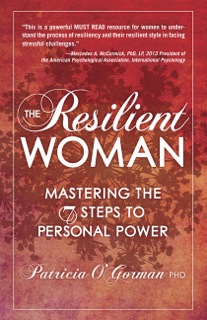Psychologist discusses ways women can succeed by overcoming societal messages
Posted by Elena del Valle on April 5, 2013

The Resilient Woman book cover
Photos: Patricia O’Gorman
Patricia O’Gorman, Ph.D., a psychologist who has worked on women, trauma and substance abuse issues, believes women are wired to try to make others happy. When they don’t live up to these self-imposed expectations, she says, they blame themselves for the hardships that follow. In The Resilient Woman: Mastering the 7 Steps to Personal Power ( HCI Books, $15.95), she proposes that the messages women learn from a young age drive them to self-sabotaging Girly Thoughts that dictate who they are and how they should act.
She defines a resilient woman as one who overcomes a traumatic event or experience such as divorce, job loss, move, marriage, motherhood, health crisis, aging or a childhood trauma. In the book, she offers an analysis of the Girly Thoughts which she equates with anti-resilience, and self-evaluation tools for readers to identify their thoughts and behaviors. She also proposes seven daily steps to lead women to create and strengthen their own resilience.
Patricia O’Gorman, author, The Resilient Woman
Society expects women to have many of the same characteristics that our grandmothers and mothers had, she says. Based on insights shared by women at workshops the psychologist has conducted, many women feel trapped believing that if they accomplish their career goals they become less desirable or not desirable; but if they seek to be desirable they must sacrifice parts of who they want to be. These beliefs often lead to anger and depression and feelings of low self esteem so prevalent women become unaware of them or their source, she says.
The 300-page softcover book published this year is divided into three main sections: Warming Up: Detecting and challenging Girly Thoughts; Start Dancing: Develop a Resilient Mind-Set; and Daily Action Steps to Develop Conscious Resilience; and 13 chapters. One of the first researchers of issues related to children of alcoholics in the early 1970s, documenting the impact of alcoholism and sobriety on adolescent development, O’Gorman created the Department of Prevention and Education for the National Council on Alcoholism and Drug Dependence (NCADD).










